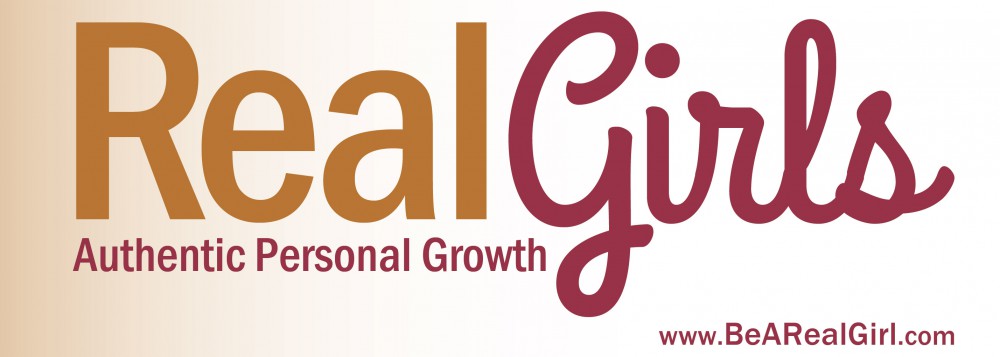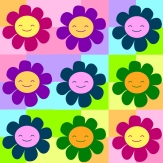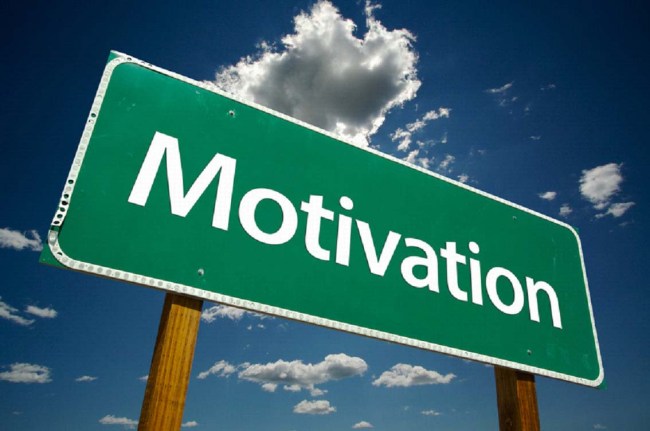My daughter has been learning about patterns in school this year. It’s a topic she really seems to enjoy. We’ve spent evenings going over homework assignments, trying to guess what the next item in a certain pattern is, and she’s getting pretty good at it. So good at it, that when she sees a pattern on a brochure, or on the wallpaper at the store, she shouts in delight, “Mom, it’s a pattern!”.
Patterns seem to be the topic of a lot of my discussions lately online and elsewhere. It originally came up during a Facebook discussion about coincidences and miracles – one person mentioned that coincidences are simply a result of our inherent wiring to see patterns. For example, when you buy a blue Ford Edge, you suddenly start seeing blue Ford Edges everywhere. You might conclude, “Geez, a lot of people are buying blue Ford Edges lately!”, but, in fact, your brain just has a propensity to identify and assign meaning to patterns.
And, as usual, leave it to me to take a relatively simple concept, tear it into a million bloody pieces, and then duct tape it back together again.
To See Patterns is Human
According to this article, as well as other studies I’ve heard quoted, our brains are hardwired to see patterns. It’s a simple part of our nature. This doesn’t mean that every chain of events or objects our brains identify as a pattern actually is a pattern, it simply means our brains are constantly on the lookout for them, without our permission. What this means is that our brains can convince us that a completely unrelated chain of events is a meaningful pattern when, in fact, it isn’t – our brain simply has a bias to conclude that. On the other side of the coin, our brains can view a chain of events that on the surface appear to have no similarities whatsoever, and see a meaningful and realistic pattern (think any five-seconds-until-the-bomb-goes-off moment in any movie in the Die Hard series) that is truly existent and can help us solve a problem. Seeing patterns is an incredible skill we’ve inherited.
The Reality of Pattern-Seeking
I wonder about this. I wonder how much this actually contributes to so many major human depravities as well as mind-blowing discoveries. I wonder how much this has to do with our racism, sexism, and stereotyping problems. Perhaps series’ of negative experiences drive our brains to seek the common element in hopes of averting future pain. It all just comes down what pattern we decide is responsible.
- A boy experiences abuse from his mother and concludes that parents are naturally mean
- A woman has 2 or 3 negative encounters with a foreigner and decides to avoid people from that country as often as possible
- A teenager is mugged at a Motel 6 and can no longer stay at that particular hotel without experiencing high levels of anxiety
- A girl gets yelled at by a certain teacher several times and develops a fear of people with the same hair and eye color
My sense is that our brains our wired to see patterns as a means of self-preservation. And once upon a time, that’s probably all we really needed that capability for. Considering that every species’ first goal is to survive, and that recognizing the enemy is a key element to that end, that would explain why this tendency is so uncontrollable! But I think in our day and age (and in our first-world country), we can use this for much, much more.
So….uh….How Does Knowing This Help Me??
I’m constantly on this strange long journey for self-actualization. I know the day will never come, but I have found that the closer I come, the happier and more comfortable I am in my own shoes. So putting a small amount of energy towards an awareness of the patterns I seek and attach meaning to seems like a worthwhile endeavor. There’s so much we can learn about ourselves and change about our thoughts and behaviors if we can harness our propensity for pattern recognition. It’s a fairly simple matter from a birds-eye view: identify the patterns our brains are attaching meaning to and determine if they are true or false, helpful or detrimental.
Luckily, we can use an age-old psychological litmus test to help determine this: If it leads you to do good or improve, it’s probably good. I have my own RealGirls version of that: if it leads you to value and love yourself authentically, it’s probably good. That’s pretty much it! So let’s start looking out how to analyze your own patterns of thinking and behaving.
Take a Mental Inventory
There’s no need to walk around all day obsessively watching every word you say and every thought that crosses your mind. In fact, that’s a really great way to drive yourself crazy (I suppose if that’s your goal…go for it!). But it helps to make a small mental note to look out for those patterns as you experience them in daily life. Since your brain is already wired for pattern recognition, finding the pattern of the patterns should be easy!
Identifying Positive Patterns
Positive patterns are the ones we’re least likely to notice and most likely to disregard. Why? Because they aren’t necessary for surviving another day! They’re fluff! But in this day and age where mental strength is paramount, recognizing positive patterns is just as important as improving negative ones. In fact, if you’re only identifying the negative, you could easily wear yourself out. The positive ones may be small, but they’re still important. Here’s some examples of some positive patterns you might see in your daily life:
- You always eat breakfast in the morning – seriously, this one has taken me ages to develop
- When you see someone who looks sad, you automatically feel empathy for them
- You react positively towards yourself when you accomplish something good
- You’ve learned the kinds of people that you tend to connect with quickly and you seek them out
Figure out what these are, pat yourself on the back, remind yourself that you’ve got a really good foundation to work from, and keep it up.
Identifying Negative Patterns
Negative patterns are probably easier to recognize, but of course, hard to change. But they need to be acknowledged without judgement to even begin the process of improving. Here are some negative patterns you may have:
- You groan every time you think about exercising
- When you get upset, you immediately look for candy or chocolate
- When you talk to a friend who sounds a little down, you automatically assume it was something you did
- When someone offers criticism you immediately take it personally
Remember, this process is all about recognizing the negative pattern without judging yourself. That’s very important. Put on the most objective glasses you can, look at yourself the way you would a dear friend, and give yourself a comfortable amount of space to less-than-perfect in!
Changing Your Patterns
This is the hard part, of course, but it’s probably not as hard as you think. See, the bad news is that you have an established pattern that your brain is wired to follow. But the good news is that once you change the pattern, your brain will shake up its old ideas and begin to establish a new pattern.
There is one change agent that I have seen to be almost universally effective in changing behaviors and thought patterns, and we can use my daughter’s example of pattern recognition to exemplify it: When my daughter is looking at her worksheet and sees a picture of a strawberry followed by a banana, then another strawberry, then another banana, she very quickly concludes that strawberry-banana is the repeated pattern.
What would make her change her mind?
There is only one thing: a difference in the pattern. She will be utterly convinced that strawberry-banana is the pattern until somewhere down the worksheet, she sees an orange. Oops! Well maybe strawberry-banana wasn’t the pattern after all! Or maybe it was part of the pattern, but it’s a different pattern than she initially imagined it to be. See, you could spend all day explaining scientifically, philosophically, or metaphorically why strawberry-banana is NOT the real pattern, but until she sits there with her hands on the paper and her eyes staring at that orange, she will not be convinced that she is wrong.
Experience is the Best Teacher
So it is with everything (assuming this is a true pattern). Experience is the best teacher. If you want to change a pattern, be it a belief or thought process or a behavior (habit), you have to experience something different. The best way to do this if you want to shake up as many patterns as possible, is to simply have lots of different experiences. Live in different states and countries, make friends with different kinds of people, eat different kinds of food, experience different types of entertainment. Talk to people who look angry at you. Ask for criticism. Building variety of experience into your life will help kill many of those untrue and unhelpful patterns or biases without you even needing to recognize them. And for those that need a little extra work (usually because the pattern has repeated itself for years upon years), you have to repeat that different experience until your brain learns a new pattern.
Here’s an example. I read somewhere (I apologize, I can’t find the reference right now, but I will post it here when I find it) that the chemical dopamine, which is known as the “reward” chemical in our bodies, is primarily released by responding to habits. For instance, when you exercise your body releases dopamine, so if you continue exercising over time your brain will learn to release dopamine when you think about exercise because it recognizes it as something that will produce a reward. So what’s the best way to teach your body and your brain to start exercising? Just start doing it. Look, you won’t get it right immediately – it typically takes me a year of attempting an exercise regime on and off every other month before it sticks – but every time you exercise (even if it’s been 6 months since your last workout) you’re giving your body and brain one more piece of evidence that this could be something it wants to reward you for ahead of time. (For a little extra boost, take the advice from another article, and try changing your thought patterns as well).
Don’t Give Up
This is just one more reason to not give up even when you can’t keep a new routine established. I know, I know, all the fitness and self-help and “positive thinking” junkies out there are telling you that you’ve got to COMMIT and DO IT and GET IT RIGHT immediately or you’ll end up fat, lazy, and depressed. And if that motivates you then stick with it, this article probably won’t help you much. But for the rest of us, we just need to know that the world doesn’t end when we fall and that the small effort we were able to make made a difference.
It does.
Even if you are only able to replace one positive thought each day, it makes a difference. Even if you can only motivate yourself to socialize once a week, it makes a difference. Even if you can only manage to work out for two weeks and then you lose motivation for the next two months, it makes a difference. Even if you only get one vacation each year to visit a new place, it makes a difference. Each one of those efforts adds another orange, teaching your brain that perhaps the pattern is not what it initially appeared to be.
Your brain will take care of most of the heavy lifting; just throw it an orange as often as possible until you achieve the new perspective, schedule, or attitude that you desire.
And maybe eat an orange too. Cuz, ya know, they’re good.



















